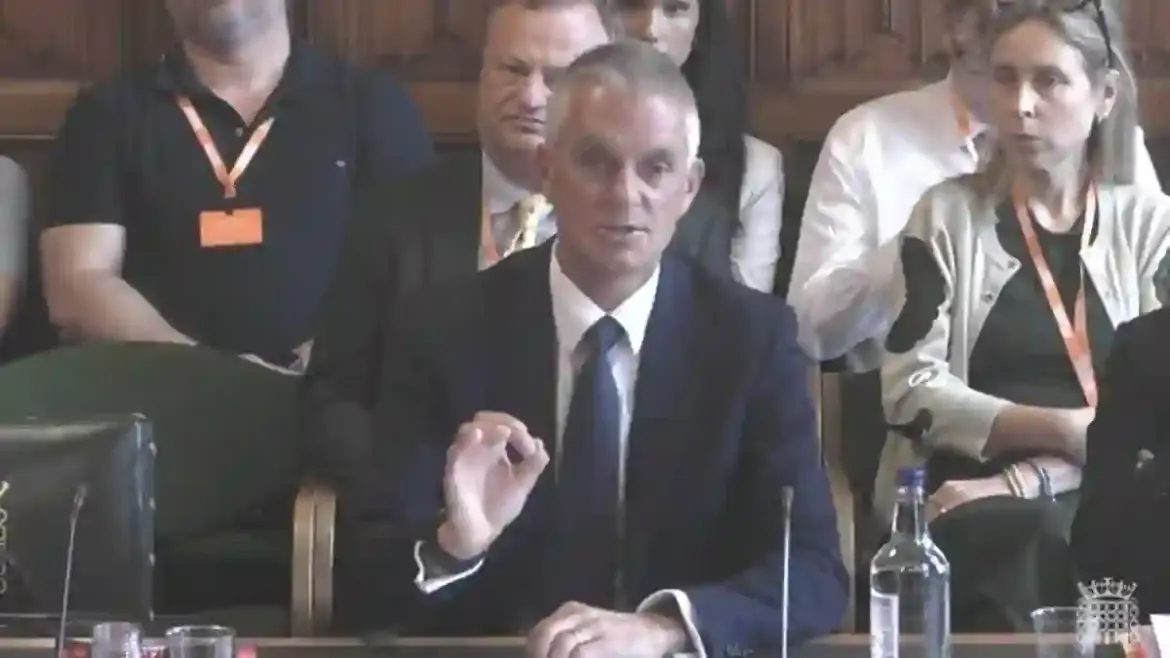It has been a turbulent summer for the BBC, and now its Director-General Tim Davie is once again under the spotlight.
Appearing before MPs, Davie faced a grilling over a string of controversies, from a Glastonbury performance that sparked accusations of antisemitism to ongoing rows about documentaries, star scandals, and impartiality.
Glastonbury Row Sparks Backlash
One of the biggest flashpoints came from rapper duo Bob Vylan, who chanted “death, death to the IDF” during their Glastonbury set.
The moment was streamed live on iPlayer, and Davie admitted it should never have gone out.
He described the broadcast as “very disturbing” and acknowledged the BBC had made a “very significant mistake.”
Labour MP James Frith accused the band of whipping up the crowd into an “antisemitic frenzy” and said he would no longer listen to their music despite owning one of their records.
Davie confirmed that staff responsible were facing “consequences,” though he refused to give details, saying it wasn’t appropriate to run a live commentary on disciplinary matters.
Questions Over BBC Culture
The session also delved into wider issues surrounding BBC “talent.”
Davie admitted he could not guarantee there would be no further scandals involving high-profile figures, referencing past controversies with Huw Edwards and MasterChef presenter Gregg Wallace.
Pressed on whether the broadcaster had a toxic culture, he pushed back, saying that while problems existed, people now felt more confident to call them out—something he framed as a “positive change.”
Still, he conceded that transforming workplace culture was “ongoing work” and not something that could be solved in six months.
The MasterChef Dilemma
MPs also challenged Davie over why the BBC aired John Torode and Gregg Wallace’s final MasterChef series despite serious complaints.
One contestant had urged the show not to be broadcast, arguing it sent the wrong message.
Davie defended the decision, pointing out that the majority of participants supported it being aired and stressing that the presenters were no longer employed by the corporation.
He added that viewers ultimately had a choice whether to watch, and research suggested most people backed the BBC’s call to continue the series.
Documentary Controversy
Another major headache for the BBC has been the documentary Gaza: How To Survive a Warzone.
It later emerged that the programme was narrated by the son of a senior Hamas official—a fact not disclosed to the audience.
Davie admitted this was a “bad mistake” and blamed the production company Hoyo Films for failing to declare the connection.
He said the BBC had since put more robust oversight systems in place, including a leadership shake-up and a new head of news documentaries.
BBC chair Dr Samir Shah stressed that the broadcaster had investigated thoroughly, including reviewing financial records, to ensure no money went to Hamas.
Political Coverage Under Scrutiny
The committee also pressed the corporation on claims that Reform UK, which has only four MPs, was receiving disproportionate coverage.
Dr Shah dismissed the allegation, arguing that the party’s four million votes in the general election warranted attention and that BBC reporting was based on representation and audience interest.
Defending Impartiality
Both Davie and Shah fiercely rejected accusations of bias within the BBC.
Questions were raised about why Robbie Gibb, a former communications chief for Theresa May, sits on the BBC board, but Shah insisted he was only a non-executive member and had no influence over day-to-day journalism.
Feeling the Strain
At the start of the committee session, Davie admitted he had been “feeling the pressure” after a wave of scandals, from Glastonbury to the MasterChef fallout and even the recent dismissal of EastEnders star Jamie Borthwick for offensive remarks.
“This is not a job for the faint-hearted,” he told MPs.
“What has been on my mind is dealing with the issues.
If I said I wasn’t feeling the pressure, I’d be inhuman.”
